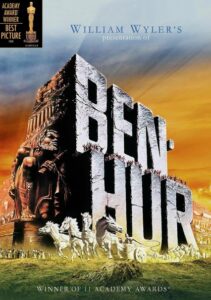Ben-Hur-1959
Director William Wyler
Starring Charlton Heston, Stephen Boyd, Haya Harareet
Scott’s Review #1,265
Reviewed June 9, 2022
Grade: A
One of the many pleasures of watching Ben-Hur (1959) is marveling at the extensive cinematic brilliance of the entire cast and crew.
Saying it’s a spectacle is not enough, and a must-see.
It had the largest budget ($15.175 million) and the most extensive sets built of any film produced at the time, allowing enormous spending to create one of cinema’s most lavish and grand films.
I shudder to think of how powerful it was to see this film on the large screen in a movie theater and the sheer mesmerizing quality it had on audiences.
I’ve anticipated viewing the film for years and finally did. Why I waited so long is beyond me. It does not disappoint, and the extravagance is immeasurable. I sat in awe at the many aspects of the film created before CGI, making it as impressive in 2022 as it was over sixty years ago.
Charlton Heston plays Judah, a Palestinian Jew who fought the Roman Empire during Christ’s time. He becomes involved in a vicious feud with his ambitious boyhood friend Messala (Stephen Boyd).
Their hatred culminates in an exciting yet vicious chariot race.
Condemned to life as an enslaved person, Judah swears vengeance against Messala. He escapes, later crossing paths with a gentle prophet named Jesus, who helps Judah save his family despite his death.
The film made a household name out of Heston and, other than its big budget, is legendary for its use of homoeroticism and an unspoken love story between two men who are at first the best of friends and who later become bitter rivals.
The film had several screenwriters, and if looking closely, some uneven storytelling is largely overlooked by the enormous spectacle of the finished product. Gore Vidal, who was openly gay, insisted on a homosexual interlude, conspicuously, of course, between Judah and Messala.
Giggle worthy to those in the know is that Boyd played his character as a spurned gay lover of Heston’s, with Heston unaware of the underlying romantic angle. This is rumored to be because Heston couldn’t handle it had he known.
This knowledge made me enjoy the subtext of the scenes between the two men even more than I should have.
To prove the above point, the written romance between Judah and Esther (Haya Harareet) lacks much chemistry, and I didn’t view them as brothers and sisters or good friends.
Other scenes of shimmering, muscular men sitting around in towels are further proof of Ben-Hur’s homoeroticism.
These juicy intrigue tidbits provide tingles, but the main draw is the famous chariot scene, which is as exciting as an action scene in a movie. The outdoor arena, packed with thousands of onlookers, provides a perfect setup for the round-and-round racetrack, as dozens of horses are whipped into a dizzying frenzy and go faster and faster.
The peril is prominent as numerous riders drop to their death, mangled into pieces from being stampeded by the horses.
Other sequences, like the leper colony and the crucifixion of Jesus, are beautiful and astounding.
Director William Wyler, a heavy hitter at the time with gems like Mrs. Miniver (1942) and The Best Years of Our Lives (1946), easily usurps those excellent films with Ben-Hur.
It won eleven of its twelve Oscar nominations and employed ten thousand extras!
Ben-Hur (1959) is the definition of an epic film. Expensive and expansive, the breathtaking chariot scene is one of the best I’ve ever seen in a film.
Not feeling dated, it’s a marvel of exquisiteness and magnificence.
Oscar Nominations: 11 wins-Best Picture (won), Best Director-William Wyler (won), Best Actor in a Leading Role-Charlton Heston (won), Best Actor in a Supporting Role-Hugh Griffith (won), Best Adapted Screenplay, Best Art Direction-Set Direction-Color (won), Best Cinematography (won), Best Costume Design-Color (won), Best Film Editing (won), Best Sound Recording (won), Best Music-Scoring of a Dramatic or Comedy Picture (won), Best Special Effects (won)
